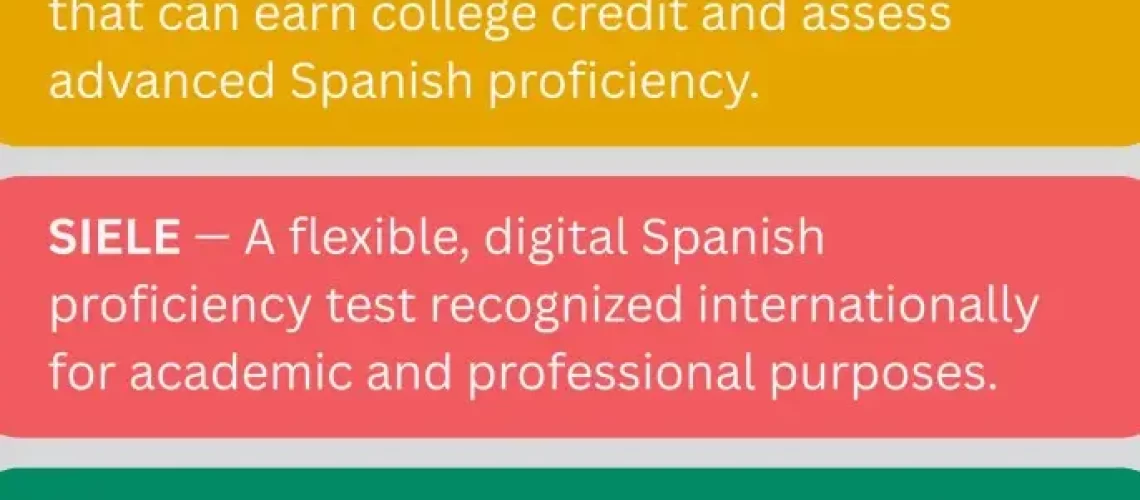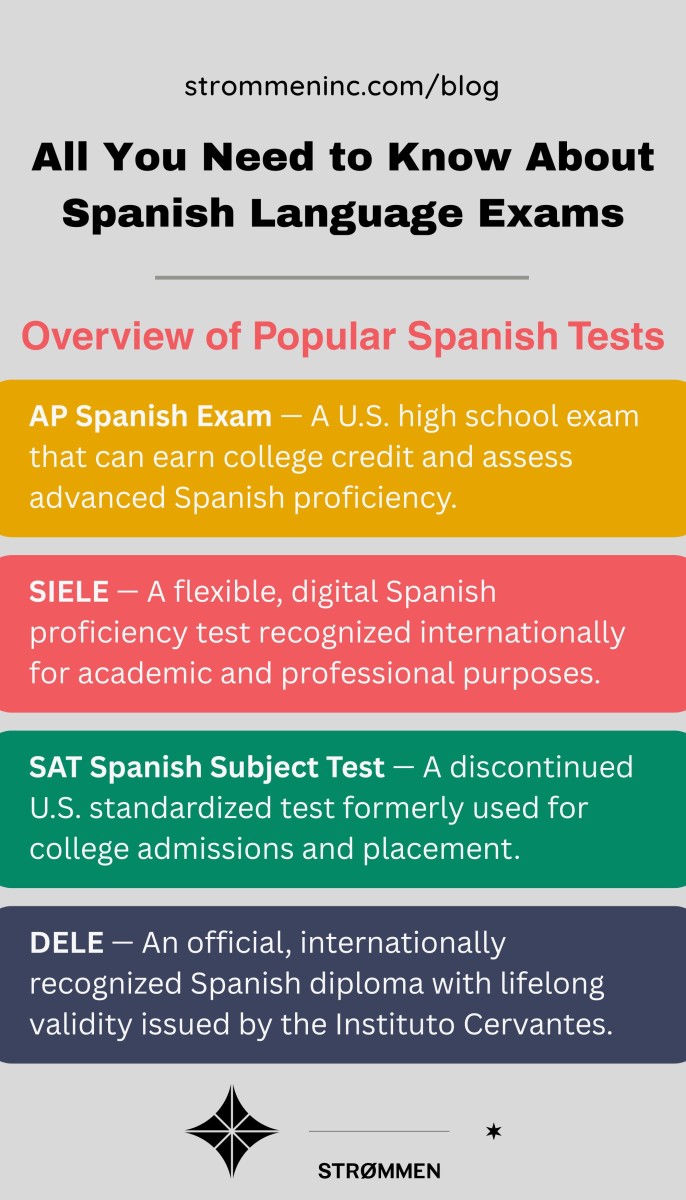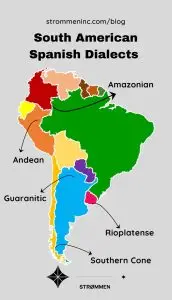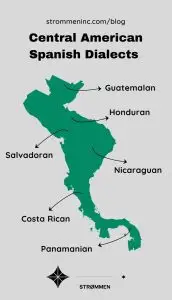Mastering Spanish is a big accomplishment, but demonstrating your abilities is frequently just as important as mastering the language itself. Whether you’re applying to college, preparing to work abroad, or simply want a formal certification of your Spanish level, there are various exams available to assess your skills.
Each exam has a particular objective, ranging from the AP Spanish Exam, which helps high school students obtain college credit, to internationally recognized assessments such as SIELE and DELE. Even if the SAT Spanish is no longer available, it’s still important to understand how it once fit into the picture, and what choices students have today.
In this guide, we’ll break down the key Spanish language tests you need to know about, explain their structure and scoring, and help you figure out which one is the right fit for your goals.
1. AP Spanish Exam
The AP Spanish Language and Culture Exam is one of the most popular ways for U.S. high school students to showcase their Spanish proficiency. Offered by the College Board, it’s designed to mirror the rigor of a university-level Spanish course and can even earn you college credit if you score well.
What the AP Spanish Exam Covers
The exam is divided into four main skill areas that reflect real-world communication in Spanish:
- Reading comprehension – interpreting articles, literary texts, and everyday materials.
- Listening comprehension – understanding conversations, interviews, and recordings.
- Writing – producing essays, persuasive arguments, and formal communications.
- Speaking – responding to prompts and participating in simulated conversations.
Scores range from 1 to 5, with most colleges granting credit for a 4 or 5 (sometimes even a 3). A high score not only strengthens your college application but may also allow you to skip introductory Spanish courses.
Who Should Take It?
- High school students aiming for college credit.
- Students who want to stand out on college applications.
- Learners who want a structured way to demonstrate advanced Spanish proficiency.
Preparation Tips
- Practice with past AP Spanish exam questions to get familiar with the format.
- Work on both academic and real-world Spanish, read articles, listen to podcasts, and practice speaking daily.
- Consider working with an AP Spanish tutor who can help refine your skills in each test area.
2. SIELE (Servicio Internacional de Evaluación de la Lengua Española)
The SIELE exam is a modern, digital Spanish proficiency test recognized worldwide. Unlike some traditional exams, SIELE is designed for flexibility and accessibility, making it a popular choice for students, professionals, and anyone looking to certify their Spanish skills.
What SIELE Covers
SIELE evaluates all four language skills in a format aligned with the CEFR levels (A1–C1):
- Reading comprehension – understanding texts from everyday life, academic sources, and professional materials.
- Listening comprehension – following conversations, interviews, and multimedia content.
- Writing – crafting essays, summaries, and formal communications.
-
Speaking – answering prompts, expressing opinions, and participating in simulated conversations.
SIELE provides a score for each skill as well as a global score, which corresponds to CEFR levels from A1 (beginner) to C1 (advanced). Results are valid for 5 years, giving you flexibility if you’re using the certification for work, study, or visa purposes.
Who Should Take It?
- University applicants needing proof of Spanish proficiency.
- Professionals seeking international recognition of their Spanish skills.
- Anyone who prefers a digital, flexible exam that can be scheduled year-round.
Preparation Tips
- Take advantage of online SIELE simulations to get comfortable with the test format.
- Focus on timed practice for reading and listening exercises.
- Work with a Spanish tutor to refine speaking and writing skills, especially for professional or academic contexts.
3. DELE (Diplomas de Español como Lengua Extranjera)
The DELE exam is the official Spanish language diploma issued by the Instituto Cervantes on behalf of the Spanish Ministry of Education. Recognized worldwide, DELE is often the go-to choice for students, professionals, and anyone seeking a permanent certification of their Spanish proficiency.
What the DELE Exam Covers
DELE evaluates all four key language skills:
- Reading comprehension – understanding texts from literature, academic sources, and practical materials.
- Listening comprehension – interpreting dialogues, interviews, and recordings.
- Writing – producing essays, reports, and structured communications.
- Speaking – engaging in conversations, oral presentations, and simulated real-world scenarios.
DELE is aligned with the CEFR levels (A1 to C2), covering beginner to mastery levels. Unlike some other tests, DELE diplomas are valid for life, making it a permanent credential for work, study, or visa purposes.
Who Should Take It?
- Professionals seeking international recognition of their Spanish skills.
- University applicants needing proof of Spanish proficiency.
- Immigrants or expatriates requiring official certification for visas or work permits.
- Anyone looking for a lifetime certification rather than a temporary score.
Preparation Tips
- Practice with past DELE exams to understand the structure and timing.
- Work with a certified Spanish tutor for focused help in writing and speaking.
- Immerse yourself in real-world Spanish, read books, watch films, and engage in conversation to boost comprehension and fluency.
4. SAT Spanish Subject Test
The SAT Spanish Subject Test was a standardized exam primarily used by U.S. high school students for college admissions and placement. While it’s no longer offered (discontinued by the College Board in 2021), understanding its purpose can help students choose alternative exams like AP Spanish, DELE, or SIELE.
What the SAT Spanish Test Covered
The SAT Spanish Subject Test focused on evaluating a student’s overall Spanish proficiency through:
- Reading comprehension – interpreting passages from literature, newspapers, and essays.
- Vocabulary and grammar – testing accuracy in grammar, sentence structure, and word usage.
- Listening comprehension – although limited, some versions included audio components.
Scores ranged from 200 to 800, similar to other SAT Subject Tests. A strong score could enhance college applications and, in some cases, allow students to skip introductory Spanish courses.
Who Took It?
- U.S. high school students applying to colleges that valued subject tests.
- Students who wanted to demonstrate proficiency beyond their GPA or AP exams.
Alternatives Today
Since the SAT Spanish Subject Test is discontinued, students now often turn to:
- AP Spanish Language and Culture Exam – for college credit and placement.
- DELE or SIELE exams – for internationally recognized Spanish proficiency certification.
How to Choose the Right Spanish Test for You
With so many Spanish language examinations to choose from, it might be difficult to make a decision. The most appropriate test for you is determined by your objectives, timeframe, and intended use of your certification. Here’s a breakdown to help you choose:
1. Consider Your Goals
- Academic credit or college placement: AP Spanish is ideal for high school students in the U.S. aiming for college credit or advanced placement.
- International certification: DELE or SIELE are recognized worldwide and are perfect if you need a credential for work, study, or visas.
- Professional recognition or flexibility: SIELE is digital and flexible, making it suitable for working professionals or students who need results quickly.
2. Timing and Flexibility
- AP Spanish – offered once a year in May; preparation must align with the school year.
- DELE – has fixed exam dates several times a year; results are permanent.
- SIELE – can be taken online almost anytime; results are valid for 5 years.
- SAT Spanish – discontinued, so focus on alternatives like AP Spanish or DELE.
3. Certification Validity
- Permanent certification: DELE diplomas last a lifetime, making them ideal for long-term goals.
- Temporary certification: SIELE results expire after 5 years, which may suit short-term academic or professional needs.
4. Personal Considerations
- Your current Spanish level – beginner, intermediate, or advanced.
- How formal or recognized you need the certification to be.
- Whether you prefer digital exams or traditional paper-based testing.
By evaluating your purpose, timing, and level, you can choose the test that aligns best with your goals. And remember, working with a tutor can make preparation more effective, helping you approach your chosen exam with confidence.
How Strommen Can Help You Prepare for Spanish Language Exams
Preparing for Spanish language exams can feel overwhelming, but you don’t have to do it alone. Strommen connects you with experienced tutors who specialize in AP Spanish, SIELE, DELE, and other proficiency tests. Our platform makes it easy to find the right tutor for your goals, schedule sessions online or in person, and get personalized guidance every step of the way.
With tailored lessons, tutors focus on the areas you need most, whether it’s reading, writing, listening, or speaking. You’ll practice with real exam materials and get actionable feedback to improve your grammar, vocabulary, and communication skills.
Strommen also offers flexible learning, so you can study anytime, anywhere, and fit sessions around school, work, or other commitments. Working with a tutor helps you not just learn Spanish, but also master the strategies and skills needed to succeed on exam day.
Start your Spanish exam prep today with Strommen and take the next step toward achieving your language goals.
Final Thoughts: Finding the Right Spanish Test
Selecting the appropriate Spanish language test does not have to be difficult. Whether you want to get college credit with AP Spanish, gain international recognition with DELE or SIELE, or look for alternatives after the SAT Spanish was canceled. The key is to match your choice to your goals, timetable, and degree of skill.
No matter the test you pick, preparation is crucial. Working with a qualified tutor can help you improve your reading, writing, listening, and speaking abilities, enhance your confidence, and perform well on exam day.
Spanish knowledge opens access to academic opportunity, professional development, and personal enrichment. Understanding the differences between AP Spanish, SIELE, SAT Spanish, and DELE will allow you to make an informed decision and progress toward mastering the language.
Are you ready to start preparing for your Spanish exam? Contact us for a consultation with our learning experts, or find a tutor near you!





